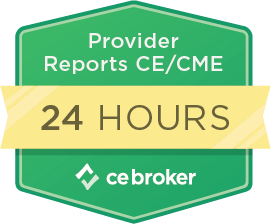The Dangers of Immobility
Many conditions can affect a person’s ability to move. Regardless of the cause of immobility, the result is significant physical changes to a person’s body. These changes further limit a person’s ability to move, creating a vicious cycle. However, you can take steps to stop this cycle and improve the person’s health status and quality of life. This course discusses the common conditions that cause immobility, the effects immobility has on the body, and the steps you can take to minimize these effects.
ITEM: #1562239
- Florida Board of Nursing - Certified Nursing Assistants

This is not an accredited course for professional license renewal. Florida CNAs may use this inservice toward meeting their annual inservice requirement.
This activity is approved for 0.5000 contact hours.
Reviewed by
14877
customer
,
August 12, 2025
By
Rating from
course evaluation survey
|
,
August 13, 2025
By
Rating from
course evaluation survey
|
,
August 12, 2025
By
Rating from
course evaluation survey
|
,
August 12, 2025
By
Rating from
course evaluation survey
|
,
August 12, 2025
By
Rating from
course evaluation survey
|
,
August 12, 2025
By
Rating from
course evaluation survey
|
,
August 12, 2025
By
Rating from
course evaluation survey
|
,
August 12, 2025
By
Rating from
course evaluation survey
|
,
August 12, 2025
By
Rating from
course evaluation survey
|
,
August 12, 2025
By
Rating from
course evaluation survey
|
,
August 12, 2025
By
Rating from
course evaluation survey
|
,
August 12, 2025
By
Rating from
course evaluation survey
|
Course Code: REL-PAC-0-DANIMM
Hours: 0.5
Type: Online Course
Content Expiration Date: 12/31/2027
Learning Objectives:
Identify three effects immobility has on the body.
Discuss measures to prevent complications associated with immobility.
Outline:
Section 1: The Dangers of Immobility
Immobility
Knowledge Check
Effects of Immobility
How You Can Help
Knowledge Check
More Ways to Help
Section 2: Conclusion
Course Summary
Course Contributor
References
Instructor: Kim Matthews, RN
Kimberly Matthews, RN obtained a nursing degree from Western Kentucky University in 1998. Ms. Matthews possesses over 20 years of nursing experience with over 17 of those in the Skilled Nursing industry. Ms. Matthews has extensive experience in MDS, restorative nursing programs, and nursing management. Ms. Matthews is currently a Post Acute Care Content writer and subject matter expert for MDS.
Target Audience:
The target audience for this course is: Direct Care Staff; in the following settings: Skilled Nursing Facility.
Relias Learning will be transparent in disclosing if any commercial support, sponsorship or co-providership is present prior to the learner completing the course.
Relias Learning has a grievance policy in place to facilitate reports of dissatisfaction. Relias Learning will make every effort to resolve each grievance in a mutually satisfactory manner. In order to report a complaint or grievance please contact Relias Learning at support@reliaslearning.com.
Course Delivery Method and Format
Asynchronous Distance Learning with interactivity which includes quizzes with questions/answers, and posttests.